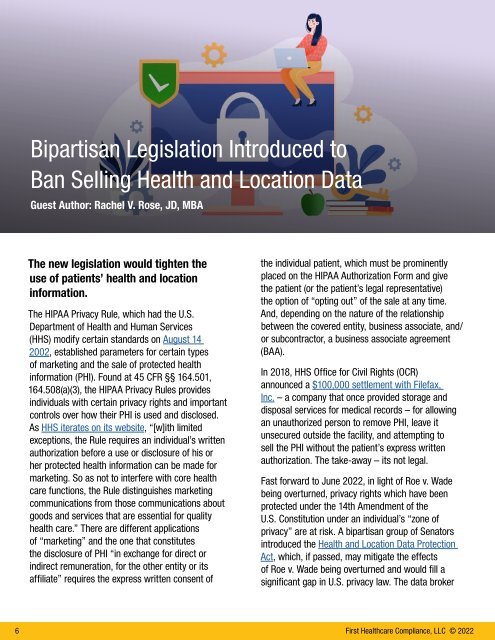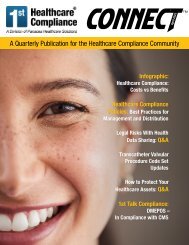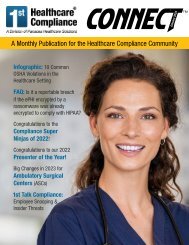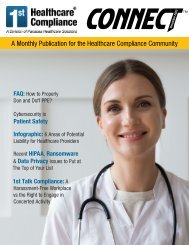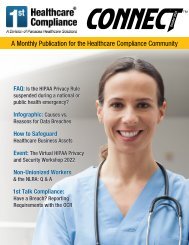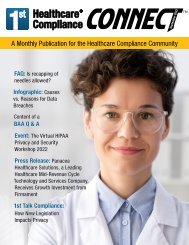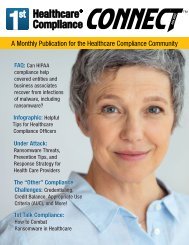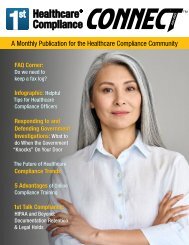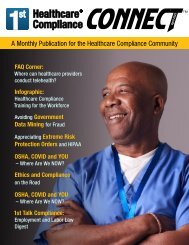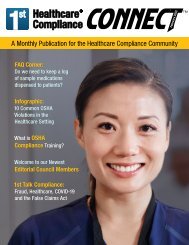First Healthcare Compliance CONNECT August 2022
You also want an ePaper? Increase the reach of your titles
YUMPU automatically turns print PDFs into web optimized ePapers that Google loves.
Bipartisan Legislation Introduced to<br />
Ban Selling Health and Location Data<br />
Guest Author: Rachel V. Rose, JD, MBA<br />
The new legislation would tighten the<br />
use of patients’ health and location<br />
information.<br />
The HIPAA Privacy Rule, which had the U.S.<br />
Department of Health and Human Services<br />
(HHS) modify certain standards on <strong>August</strong> 14<br />
2002, established parameters for certain types<br />
of marketing and the sale of protected health<br />
information (PHI). Found at 45 CFR §§ 164.501,<br />
164.508(a)(3), the HIPAA Privacy Rules provides<br />
individuals with certain privacy rights and important<br />
controls over how their PHI is used and disclosed.<br />
As HHS iterates on its website, “[w]ith limited<br />
exceptions, the Rule requires an individual’s written<br />
authorization before a use or disclosure of his or<br />
her protected health information can be made for<br />
marketing. So as not to interfere with core health<br />
care functions, the Rule distinguishes marketing<br />
communications from those communications about<br />
goods and services that are essential for quality<br />
health care.” There are different applications<br />
of “marketing” and the one that constitutes<br />
the disclosure of PHI “in exchange for direct or<br />
indirect remuneration, for the other entity or its<br />
affiliate” requires the express written consent of<br />
the individual patient, which must be prominently<br />
placed on the HIPAA Authorization Form and give<br />
the patient (or the patient’s legal representative)<br />
the option of “opting out” of the sale at any time.<br />
And, depending on the nature of the relationship<br />
between the covered entity, business associate, and/<br />
or subcontractor, a business associate agreement<br />
(BAA).<br />
In 2018, HHS Office for Civil Rights (OCR)<br />
announced a $100,000 settlement with Filefax,<br />
Inc. – a company that once provided storage and<br />
disposal services for medical records – for allowing<br />
an unauthorized person to remove PHI, leave it<br />
unsecured outside the facility, and attempting to<br />
sell the PHI without the patient’s express written<br />
authorization. The take-away – its not legal.<br />
Fast forward to June <strong>2022</strong>, in light of Roe v. Wade<br />
being overturned, privacy rights which have been<br />
protected under the 14th Amendment of the<br />
U.S. Constitution under an individual’s “zone of<br />
privacy” are at risk. A bipartisan group of Senators<br />
introduced the Health and Location Data Protection<br />
Act, which, if passed, may mitigate the effects<br />
of Roe v. Wade being overturned and would fill a<br />
significant gap in U.S. privacy law. The data broker<br />
6<br />
<strong>First</strong> <strong>Healthcare</strong> <strong>Compliance</strong>, LLC © <strong>2022</strong>


